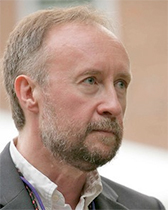Letter from the Chair

On behalf of myself, our faculty, and our staff, I extend our wish that you and your families are staying safe and sane in these turbulent times. Writing to you now about recent developments in our department seems almost inappropriate with so many larger events occupying our attention. But I hope our news will prove a comfort in letting you know both how we are responding to those events and how even in the midst of all this, some everyday things go on.
Along with the rest of the University, the Economics Department moved to entirely online instruction for the Spring Quarter. It was a challenge to do so in the short time we had, but with the help of some particularly tech-savvy faculty (check out Ivan Canay's YouTube videos when you can) and our dedicated staff (working from home like the faculty), we managed to pull it off. We are preparing for a Fall Quarter that will also be primarily online as most classes in our department are too large to fit into existing classroom spaces and still observe adequate social distancing. Our departmental seminars and faculty meetings will also remain remote for the foreseeable future.
Though all these steps are essential in helping to fight the spread of Coronavirus, we all look forward to the day when we can return to campus and interact as we had previously: casually bumping into faculty and students in the hallways or peeking into the offices of colleagues, congregating around the espresso machine, and obsessively checking our mailboxes for those little “You Have a Package” slips when awaiting a delivery.
The life of the department, however, continues – arrivals and departures, honors and awards, publications and working papers. We welcomed two new faculty members who will start in January 2021, Annie Liang and Ben Golub. Annie comes to us from the University of Pennsylvania department of economics, and Ben from the Harvard University department of economics. Both work at the intersection of economics and computer science and will anchor our department’s new cooperative arrangement with the computer science department in the McCormick School of Engineering, creating a set of courses that will better prepare students at both the undergraduate and graduate levels for research careers in the burgeoning area of “big data analytics.” We bid farewell to Matt Notowidigdo, who has returned to the Booth School of Business at the University of Chicago. And we congratulate Burt Weisbrod who will move to emeritus status in August. We would miss Burt, but he’s not actually going anywhere – he will still participate fully in the life of the department, retaining an office, studying the not-for-profit sector, and mentoring undergraduates, several of them have gone on to be accepted into top Ph.D. programs in economics.
We celebrate the achievements of three of our colleagues who were recently awarded named chairs in economics in recognition of their outstanding research, teaching, and service to the department – Ivan Canay, Seema Jayachandran (whose columns continue to appear in the Business section of the Sunday New York Times), and Guido Lorenzoni. Recent research on the pandemic and the interactions between epidemiology and economics by Marty Eichenbaum and Matthias Doepke has received considerable attention both within the field and from the national media. Piotr Dworczak’s new paper on redistribution through markets in settings with high inequality was just accepted at Econometrica but has also received considerable attention on Twitter.
Even as we in economics have been dealing in our teaching, our research, and our everyday lives with a global pandemic, another set of issues has been raised by the protests and dialog following the killing of George Floyd in Minneapolis. The field of economics and our department are not disinterested bystanders in the ensuing debates. We find ourselves challenged to devise ways to promote diversity, both in the world at large and in our own backyard. The continued influence and credibility of our work depends on it. We have taken several steps in the department to address the pronounced lack of diversity in our field.
I have appointed a committee, chaired by Associate Professor Lori Beaman and comprising faculty, staff, and graduate students to advise the department on how we can do better to make our environment as inclusive and as welcoming as possible. We have reached out to the American Economic Association Summer Program (a continuing effort to prepare students from underrepresented groups to be competitive applicants to top economics Ph.D. programs, now housed at Howard University) to offer our faculty as guest lecturers, instructors, and mentors to program participants as they undertake research projects. Finally, we are exploring partnerships with both the Chicago Public Schools and Evanston Township High School to get more high school students engaged with economics even before they get to college. We have scheduled a range of events to bring a more diverse group of students into the undergraduate major in economics at Northwestern.
These efforts represent merely a start at expanding the range of voices we hear in economics. You no doubt have other ideas and perhaps even concrete steps and additional partnerships to suggest. I eagerly look forward to hearing from you on these and other issues and will keep you apprised of our progress. It is easy to be overwhelmed in the face of the challenges confronting us. But we also share a faith in the usefulness of economics in devising and implementing creative solutions to them. Let’s start.
Joseph Ferrie
Professor; Department Chair
The Department of Economics would like to assess your experience as it relates to our department. We appreciate your anonymous feedback. The survey is estimated to take less than 5 minutes to complete.
